Women who are going through the menopause phase may need practical tips on how to keep their skin healthy and rejuvenated. One of the major changes that occur during menopause is the decline in collagen levels. Collagen is a protein that keeps our skin firm, plump, and youthful. When it declines, it leads to crepey skin, fine lines, wrinkles, brittle nails, and weak hair. Thankfully, there are proven ways to boost collagen during menopause. This post will give you practical tips on how to increase collagen levels and why it is crucial to do so, especially during menopause.
Embracing a Collagen-Rich Diet: The First Step towards Youthful Skin
Hormones play a significant part in the production of collagen, a fact that becomes particularly evident during menopause. Estrogen, a hormone that experiences a drastic decrease during menopause, is crucial for collagen production. It helps stimulate the cells responsible for producing collagen fibroblasts. As estrogen levels drop during menopause, so does collagen production, leading to the common symptoms of ageing, such as wrinkles, sagging skin, and brittle nails. Therefore, understanding and managing hormone levels becomes key to maintaining collagen production and countering the effects of ageing during menopause. Embracing a collagen-rich diet is an excellent idea, but there are other strategies you can also implement, which we'll go on to discuss next.
Proven Strategies for Boosting Collagen Levels During Menopause
Eat collagen-rich food

Eating a healthy diet filled with fruits, vegetables, lean protein, and healthy fats is crucial for maintaining healthy skin during menopause. Adding collagen-rich foods like bone broth, poultry, fish, and berries can help boost collagen production within the body. These foods are rich in amino acids, which are the building blocks for collagen- a protein that makes up elastin and collagen fibres in the skin.
Use collagen supplements
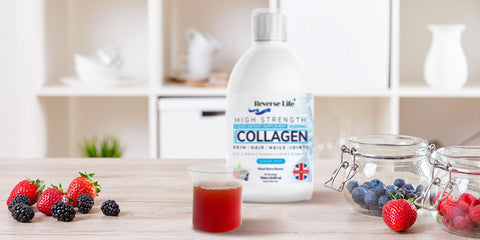
Supplements like Reverse Life liquid collagen are effective in replenishing the body’s declining collagen levels during menopause. This supplement contains hydrolysed collagen, which is easily absorbed into the body and supports healthy skin, nails, and hair growth. Taking this supplement daily can help reduce the effects of ageing, including fine lines, wrinkles, and sagging skin.
Use sunscreen
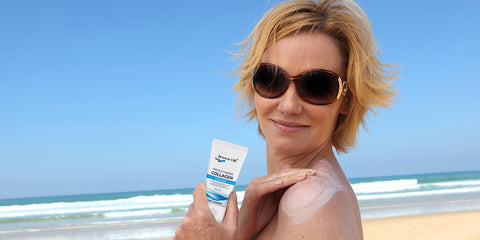
Prolonged exposure to the sun can damage the skin cells and cause the breakdown of collagen. It’s essential to wear sunscreen with a broad-spectrum SPF of 30 or higher daily. This is especially important during menopause when the skin is more vulnerable to the damaging effects of UV rays.
Exercise regularly

Regular exercise has several benefits for the skin, including boosting collagen production. Exercise increases blood flow, oxygen, and nutrients to the skin, which helps improve its elasticity and appearance. Women going through menopause should aim to exercise for at least 30 minutes a day, three to four times a week.
Practice stress-reducing techniques

Stress can cause the production of cortisol, which in turn can break down collagen, leading to fine lines and wrinkles. Menopausal women may benefit from practising stress-reducing techniques like yoga, meditation, or deep breathing exercises. These techniques help regulate cortisol levels and promote collagen production in the skin.
Stay hydrated
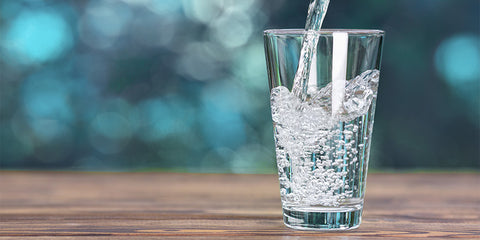
Water is essential for maintaining skin hydration and health. Drinking plenty of water can help keep the skin moist and supple. It can also help flush out toxins, further promoting skin health.
Avoid harsh soaps

Soaps can strip the skin of natural oils, leading to dryness and irritation. Choose gentle cleansers that are free of harsh chemicals and perfumes. These cleansers will clean your skin without causing unnecessary dryness or irritation.
Moisturise daily
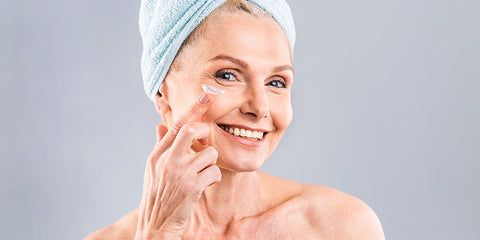
Use a moisturiser that is specifically designed for mature skin. These moisturisers often contain ingredients like hyaluronic acid and ceramides, which help to replenish the skin's natural barrier, lock in moisture, reduce the appearance of fine lines, and improve skin elasticity.
Quit smoking
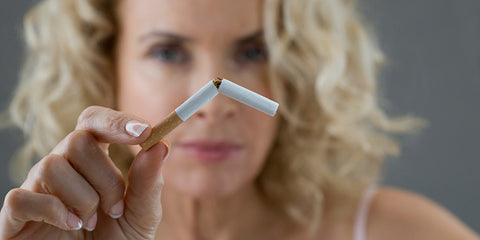
Smoking reduces the skin's natural elasticity by causing the breakdown of collagen and reducing collagen production. It also constricts blood vessels, reducing the flow of oxygen and nutrients that are necessary for skin health. Quitting smoking will improve your skin's health and appearance.
Regular skin check-ups

Regular visits to a dermatologist can help detect any skin abnormalities early. As we age, our skin becomes more susceptible to skin conditions such as age spots, skin tags, and even skin cancer. Regular check-ups ensure that any potential skin issues are treated promptly.
Final Thoughts on Collagen for Menopausal Women
Menopause doesn’t mean you have to give up on youthful skin and healthy hair. Taking steps to increase your collagen levels through simple changes in your diet, exercise, and skincare routine can improve your skin’s elasticity and appearance. Using collagen supplements like Reverse Life Original Collagen can be a practical and effective way to replenish your body’s declining collagen levels. Remember, staying hydrated, protecting your skin from the sun, and managing stress levels is essential for maintaining healthy skin during menopause. With a little self-care and the right information, you can look and feel your best during this phase of life.


